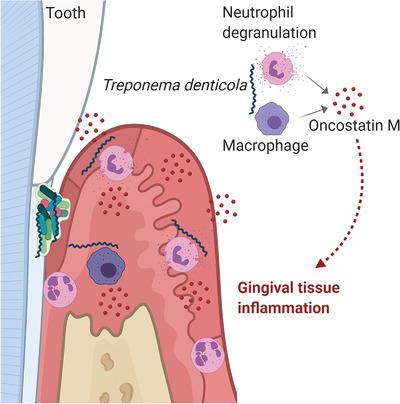当前位置:
X-MOL 学术
›
J. Leukoc. Biol.
›
论文详情
Our official English website, www.x-mol.net, welcomes your
feedback! (Note: you will need to create a separate account there.)
Treponema denticola stimulates Oncostatin M cytokine release and de novo synthesis in neutrophils and macrophages.
Journal of Leukocyte Biology ( IF 3.6 ) Pub Date : 2020-07-17 , DOI: 10.1002/jlb.4ma0620-072rr Megan M Jones 1 , Stephen T Vanyo 1 , Wael Ibraheem 2 , Abhiram Maddi 2, 3 , Michelle B Visser 1
Journal of Leukocyte Biology ( IF 3.6 ) Pub Date : 2020-07-17 , DOI: 10.1002/jlb.4ma0620-072rr Megan M Jones 1 , Stephen T Vanyo 1 , Wael Ibraheem 2 , Abhiram Maddi 2, 3 , Michelle B Visser 1
Affiliation

|
Oncostatin M (OSM) is a pleiotropic cytokine elevated in a number of inflammatory conditions including periodontal disease. OSM is produced by a variety of immune cells and has diverse functionality such as regulation of metabolic processes, cell differentiation, and the inflammatory response to bacterial pathogens. The oral cavity is under constant immune surveillance including complementary neutrophil and macrophage populations, due to a persistent symbiotic bacterial presence. Periodontal disease is characterized by a dysbiotic bacterial community, with an abundance of Treponema denticola. Despite strong associations with severe periodontal disease, the source and mechanism of the release of OSM have not been defined in the oral cavity. We show that OSM protein is elevated in the gingival epithelium and immune cell infiltrate during periodontal disease. Furthermore, salivary and oral neutrophil OSM is elevated in correlation with the presence of T. denticola. In an air pouch infection model, T. denticola stimulated higher levels of OSM than the oral pathogen Porphorymonas gingivalis, despite differential recruitment of innate immune cells suggesting T. denticola has distinct properties to elevate OSM levels. OSM release and transcription were increased in isolated human blood, oral neutrophils, or macrophages exposed to T. denticola in vitro as measured by ELISA, qPCR, and microscopy. Using transcription, translation, and actin polymerization inhibition, we found that T. denticola stimulates both OSM release through degranulation and de novo synthesis in neutrophils and also OSM release and synthesis in macrophages. Differential induction of OSM by T. denticola may promote clinical periodontal disease.
中文翻译:

齿状密螺旋体刺激制瘤素 M 细胞因子的释放以及中性粒细胞和巨噬细胞中的从头合成。
制瘤素 M (OSM) 是一种多效细胞因子,在包括牙周病在内的多种炎症性疾病中升高。OSM 由多种免疫细胞产生,具有多种功能,例如调节代谢过程、细胞分化和对细菌病原体的炎症反应。由于共生细菌的持续存在,口腔处于持续的免疫监视之下,包括互补的中性粒细胞和巨噬细胞群。牙周病的特点是菌群失调,含有大量的齿垢密螺旋体。尽管与严重的牙周病密切相关,但口腔中 OSM 释放的来源和机制尚未确定。我们发现,牙周病期间牙龈上皮中的 OSM 蛋白升高,并且免疫细胞浸润。此外,唾液和口腔中性粒细胞 OSM 升高与齿垢毛细菌的存在相关。在气袋感染模型中,尽管先天免疫细胞的募集存在差异,表明齿状毛菌具有提高 OSM 水平的独特特性,但齿状毛菌刺激的 OSM 水平高于口腔病原体牙龈卟啉单胞菌。通过 ELISA、qPCR 和显微镜检测,在体外暴露于T. denticola 的分离人血液、口腔中性粒细胞或巨噬细胞中,OSM 的释放和转录增加。通过转录、翻译和肌动蛋白聚合抑制,我们发现T. denticola通过中性粒细胞中的脱颗粒和从头合成来刺激 OSM 释放,并且还刺激巨噬细胞中的 OSM 释放和合成。T. denticola差异诱导 OSM可能促进临床牙周病。
更新日期:2020-07-17
中文翻译:

齿状密螺旋体刺激制瘤素 M 细胞因子的释放以及中性粒细胞和巨噬细胞中的从头合成。
制瘤素 M (OSM) 是一种多效细胞因子,在包括牙周病在内的多种炎症性疾病中升高。OSM 由多种免疫细胞产生,具有多种功能,例如调节代谢过程、细胞分化和对细菌病原体的炎症反应。由于共生细菌的持续存在,口腔处于持续的免疫监视之下,包括互补的中性粒细胞和巨噬细胞群。牙周病的特点是菌群失调,含有大量的齿垢密螺旋体。尽管与严重的牙周病密切相关,但口腔中 OSM 释放的来源和机制尚未确定。我们发现,牙周病期间牙龈上皮中的 OSM 蛋白升高,并且免疫细胞浸润。此外,唾液和口腔中性粒细胞 OSM 升高与齿垢毛细菌的存在相关。在气袋感染模型中,尽管先天免疫细胞的募集存在差异,表明齿状毛菌具有提高 OSM 水平的独特特性,但齿状毛菌刺激的 OSM 水平高于口腔病原体牙龈卟啉单胞菌。通过 ELISA、qPCR 和显微镜检测,在体外暴露于T. denticola 的分离人血液、口腔中性粒细胞或巨噬细胞中,OSM 的释放和转录增加。通过转录、翻译和肌动蛋白聚合抑制,我们发现T. denticola通过中性粒细胞中的脱颗粒和从头合成来刺激 OSM 释放,并且还刺激巨噬细胞中的 OSM 释放和合成。T. denticola差异诱导 OSM可能促进临床牙周病。










































 京公网安备 11010802027423号
京公网安备 11010802027423号